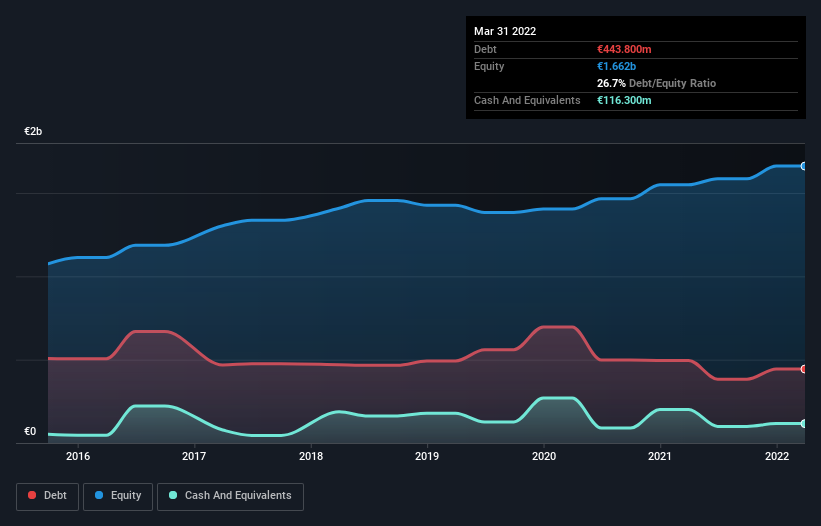Here's Why Rémy Cointreau (EPA:RCO) Can Manage Its Debt Responsibly
Some say volatility, rather than debt, is the best way to think about risk as an investor, but Warren Buffett famously said that 'Volatility is far from synonymous with risk.' So it might be obvious that you need to consider debt, when you think about how risky any given stock is, because too much debt can sink a company. We can see that Rémy Cointreau SA (EPA:RCO) does use debt in its business. But should shareholders be worried about its use of debt?
What Risk Does Debt Bring?
Debt is a tool to help businesses grow, but if a business is incapable of paying off its lenders, then it exists at their mercy. In the worst case scenario, a company can go bankrupt if it cannot pay its creditors. However, a more frequent (but still costly) occurrence is where a company must issue shares at bargain-basement prices, permanently diluting shareholders, just to shore up its balance sheet. By replacing dilution, though, debt can be an extremely good tool for businesses that need capital to invest in growth at high rates of return. The first step when considering a company's debt levels is to consider its cash and debt together.
View our latest analysis for Rémy Cointreau
How Much Debt Does Rémy Cointreau Carry?
As you can see below, Rémy Cointreau had €443.8m of debt at March 2022, down from €495.7m a year prior. However, because it has a cash reserve of €116.3m, its net debt is less, at about €327.5m.

How Healthy Is Rémy Cointreau's Balance Sheet?
The latest balance sheet data shows that Rémy Cointreau had liabilities of €867.2m due within a year, and liabilities of €449.7m falling due after that. Offsetting these obligations, it had cash of €116.3m as well as receivables valued at €180.1m due within 12 months. So its liabilities total €1.02b more than the combination of its cash and short-term receivables.
Of course, Rémy Cointreau has a market capitalization of €8.68b, so these liabilities are probably manageable. However, we do think it is worth keeping an eye on its balance sheet strength, as it may change over time.
In order to size up a company's debt relative to its earnings, we calculate its net debt divided by its earnings before interest, tax, depreciation, and amortization (EBITDA) and its earnings before interest and tax (EBIT) divided by its interest expense (its interest cover). The advantage of this approach is that we take into account both the absolute quantum of debt (with net debt to EBITDA) and the actual interest expenses associated with that debt (with its interest cover ratio).
Rémy Cointreau has a low net debt to EBITDA ratio of only 0.90. And its EBIT covers its interest expense a whopping 32.5 times over. So we're pretty relaxed about its super-conservative use of debt. On top of that, Rémy Cointreau grew its EBIT by 42% over the last twelve months, and that growth will make it easier to handle its debt. When analysing debt levels, the balance sheet is the obvious place to start. But ultimately the future profitability of the business will decide if Rémy Cointreau can strengthen its balance sheet over time. So if you want to see what the professionals think, you might find this free report on analyst profit forecasts to be interesting.
Finally, a company can only pay off debt with cold hard cash, not accounting profits. So we always check how much of that EBIT is translated into free cash flow. Looking at the most recent three years, Rémy Cointreau recorded free cash flow of 29% of its EBIT, which is weaker than we'd expect. That's not great, when it comes to paying down debt.
Our View
Rémy Cointreau's interest cover suggests it can handle its debt as easily as Cristiano Ronaldo could score a goal against an under 14's goalkeeper. But, on a more sombre note, we are a little concerned by its conversion of EBIT to free cash flow. Taking all this data into account, it seems to us that Rémy Cointreau takes a pretty sensible approach to debt. That means they are taking on a bit more risk, in the hope of boosting shareholder returns. There's no doubt that we learn most about debt from the balance sheet. But ultimately, every company can contain risks that exist outside of the balance sheet. For example, we've discovered 1 warning sign for Rémy Cointreau that you should be aware of before investing here.
At the end of the day, it's often better to focus on companies that are free from net debt. You can access our special list of such companies (all with a track record of profit growth). It's free.
New: AI Stock Screener & Alerts
Our new AI Stock Screener scans the market every day to uncover opportunities.
• Dividend Powerhouses (3%+ Yield)
• Undervalued Small Caps with Insider Buying
• High growth Tech and AI Companies
Or build your own from over 50 metrics.
Have feedback on this article? Concerned about the content? Get in touch with us directly. Alternatively, email editorial-team (at) simplywallst.com.
This article by Simply Wall St is general in nature. We provide commentary based on historical data and analyst forecasts only using an unbiased methodology and our articles are not intended to be financial advice. It does not constitute a recommendation to buy or sell any stock, and does not take account of your objectives, or your financial situation. We aim to bring you long-term focused analysis driven by fundamental data. Note that our analysis may not factor in the latest price-sensitive company announcements or qualitative material. Simply Wall St has no position in any stocks mentioned.
About ENXTPA:RCO
Rémy Cointreau
Engages in the production, sale, and distribution of liqueurs and spirits.
Excellent balance sheet and fair value.
Market Insights
Community Narratives



